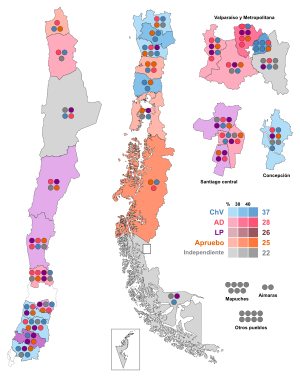
Back Εκλογές για τη Συντακτική Συνέλευση της Χιλής 2021 Greek Elecciones de convencionales constituyentes de Chile de 2021 Spanish Élections constituantes chiliennes de 2021 French Elezioni della Convenzione costituzionale cilena del 2021 Italian Eleição para Convenção Constitucional Chilena de 2021 Portuguese 2021年智利制宪会议选举 Chinese
| |||||||||||||||||||||||||||||||||||||||||||||||||||||
155 seats in the Chilean Constitutional Convention | |||||||||||||||||||||||||||||||||||||||||||||||||||||
|---|---|---|---|---|---|---|---|---|---|---|---|---|---|---|---|---|---|---|---|---|---|---|---|---|---|---|---|---|---|---|---|---|---|---|---|---|---|---|---|---|---|---|---|---|---|---|---|---|---|---|---|---|---|
| Registered | 14,900,190 | ||||||||||||||||||||||||||||||||||||||||||||||||||||
| Turnout | 43.43% | ||||||||||||||||||||||||||||||||||||||||||||||||||||
| |||||||||||||||||||||||||||||||||||||||||||||||||||||
 Results of the 2021 Chilean Constitutional Convention election.[1] | |||||||||||||||||||||||||||||||||||||||||||||||||||||
An election for the members of the Constitutional Convention was held in Chile between 15 and 16 May 2021.[2] This election was called after 78% of voters in the 2020 national plebiscite voted to write a new Constitution through this method.[3]
After massive protests and riots sparked in October 2019, an agreement was reached on 15 November 2019 between several political parties to start the process to write a new Constitution.[4] In case the first referendum was approved (originally scheduled for 26 April 2021), a special election would be called to select the members of the Constitutional Convention. This election was originally scheduled for 25 October 2020, six months after the first referendum. However, due to the impact of the COVID-19 pandemic in Chile, the first referendum was moved to 25 October and the eventual election of the members of the Convention was scheduled for 11 April 2021.[5] The extension of the pandemic forced the government to change the date of the election twice later: in March 2021, the election was extended to two days (10 and 11 April)[6] and later, it was postponed by one month to 15 and 16 May 2021 due to a rise in COVID-19 cases.[2]
This was the first time that Chilean citizens were able to vote for the members of the body created to write the Constitution. Although based originally in the system to elect the 155 members of the Chamber of Deputies, this election process established several changes. For the first time, 17 reserved seats were established for the 10 official indigenous groups. Also, different mechanisms in the inscription of candidates and the election system itself were designed to ensure gender parity in the Convention, being the first assembly of this kind in the world with equal representation of men and women.[7]
The election's results were considered a surprise and a complete rearrangement of the political system in Chile established since the end of Pinochet's dictatorship in 1990. A large share of elected members (65 out of 155) were independent candidates organized in new lists (26 from the anti-establishment People's List, 22 others and 17 indigenous representatives). Although Chile Vamos, the governing alliance, was the most voted list in the country, it represented the lowest results in Chilean modern history for right-wing politics, not even reaching the third of members needed to veto in the Convention.[8][9] The successor to Concertación, the main centre-left alliance, finished in fourth place, being surpassed by the alliance made by the leftist Communist Party and the Broad Front.[10] The List of the People, an anti-establishment list of independent candidates, finished in third place.
- ^ "SERVEL". www.servelelecciones.cl. Retrieved 2021-05-17.
- ^ a b "Presidente Piñera promulga reforma que posterga elecciones al 15 y 16 de mayo". El Mostrador (in Spanish). 2021-04-06. Retrieved 2021-04-07.
- ^ "Jubilation as Chile votes to rewrite constitution". BBC News. October 26, 2020.
- ^ "Acuerdo por la Paz y la Nueva Constitución" (PDF). Library of the National Congress of Chile. 15 November 2019. Archived (PDF) from the original on 2020-10-13. Retrieved 15 May 2021.
- ^ "Piñera promulgó reforma constitucional que posterga el plebiscito: "Era necesario"". CNN Chile (in Spanish). Archived from the original on 2020-03-27. Retrieved 2021-05-16.
- ^ "President Piñera enacts laws regarding the elections on April 10 and 11". Chile Reports. Archived from the original on 2021-05-02. Retrieved 2021-05-16.
- ^ Arce Riffo, Javiera (2020-04-04). "Gender Parity in the Chilean Constitutional Convention: What Does it Mean for Chilean Democracy?". OHRH. Archived from the original on 2020-05-15. Retrieved 2021-05-16.
- ^ "Chile chooses independents to draft new constitution". www.aljazeera.com. Retrieved 2021-05-17.
- ^ "Chile's govt in shock loss as voters pick independents to draft constitution". Reuters. 2021-05-17. Retrieved 2021-05-17.
- ^ Montes, Rocío (2021-05-16). "Los chilenos castigan a los partidos políticos en sus elecciones constituyentes". EL PAÍS (in Spanish). Retrieved 2021-05-17.



